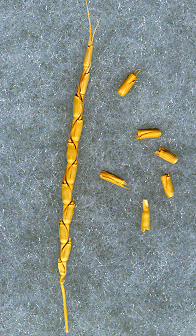
In the fields of molecular biology and genetics, a genome is all the genetic information of an organism. It consists of nucleotide sequences of DNA. The nuclear genome includes protein-coding genes and non-coding genes, other functional regions of the genome such as regulatory sequences, and often a substantial fraction of junk DNA with no evident function. Almost all eukaryotes have mitochondria and a small mitochondrial genome. Algae and plants also contain chloroplasts with a chloroplast genome.

The peanut, also known as the groundnut, goober (US), pindar (US) or monkey nut (UK), is a legume crop grown mainly for its edible seeds. It is widely grown in the tropics and subtropics, important to both small and large commercial producers. It is classified as both a grain legume and, due to its high oil content, an oil crop. World annual production of shelled peanuts was 44 million tonnes in 2016, led by China with 38% of the world total. Atypically among legume crop plants, peanut pods develop underground (geocarpy) rather than above ground. With this characteristic in mind, the botanist Carl Linnaeus gave peanuts the specific epithet hypogaea, which means "under the earth".

Arachis is a genus of about 70 species of annual and perennial flowering plants in the family (Fabaceae), native to South America, and was recently assigned to the informal monophyletic Pterocarpus clade of the Dalbergieae. At least one species, the peanut, is a major food crop species of global importance; some of the other species are cultivated for food to a small extent in South America. Other species such as A. pintoi are cultivated worldwide as forage and soil conditioner plants, with the leaves providing high-protein feed for grazing livestock and a nitrogen source in agroforestry and permaculture systems.

Medicago truncatula, the barrelclover, strong-spined medick, barrel medic, or barrel medick, is a small annual legume native to the Mediterranean region that is used in genomic research. It is a low-growing, clover-like plant 10–60 centimetres (3.9–23.6 in) tall with trifoliate leaves. Each leaflet is rounded, 1–2 centimetres (0.39–0.79 in) long, often with a dark spot in the center. The flowers are yellow, produced singly or in a small inflorescence of two to five together; the fruit is a small, spiny pod.

The J. Craig Venter Institute (JCVI) is a non-profit genomics research institute founded by J. Craig Venter, Ph.D. in October 2006. The institute was the result of consolidating four organizations: the Center for the Advancement of Genomics, The Institute for Genomic Research (TIGR), the Institute for Biological Energy Alternatives, and the J. Craig Venter Science Foundation Joint Technology Center. It has facilities in Rockville, Maryland and San Diego, California.

The Actinomycetales is an order of Actinomycetota. A member of the order is often called an actinomycete. Actinomycetales are generally gram-positive and anaerobic and have mycelia in a filamentous and branching growth pattern. Some actinomycetes can form rod- or coccoid-shaped forms, while others can form spores on aerial hyphae. Actinomycetales bacteria can be infected by bacteriophages, which are called actinophages. Actinomycetales can range from harmless bacteria to pathogens with resistance to antibiotics.

In evolutionary biology, conserved sequences are identical or similar sequences in nucleic acids or proteins across species, or within a genome, or between donor and receptor taxa. Conservation indicates that a sequence has been maintained by natural selection.

Steven Lloyd Salzberg is an American computational biologist and computer scientist who is a Bloomberg Distinguished Professor of Biomedical Engineering, Computer Science, and Biostatistics at Johns Hopkins University, where he is also Director of the Center for Computational Biology.

Aegilops tauschii, the Tausch's goatgrass or rough-spike hard grass, is an annual grass species. It is native to Crimea, the Caucasus region, western and Central Asia, Afghanistan, Pakistan, the western Himalaya, and parts of China, and has been introduced to other locales, including California.
Arachis batizocoi is a herb native to Bolivia and Paraguay. This plant is cited as gene sources for research in plant biology of peanut. Arachis batizocoi maintains a divergent genome as well as high fertility that facilitates the upbringing of new and beneficial alleles within peanut crops. Such high crossability has increased the frequency of several advantageous alleles that have improved plant life and agricultural output. Among these are boosted resistance against groundnut yield-limiting diseases such as late leaf spot (LLS) and groundnut rosette disease (GRD), larger seeds, and a higher overall yield.
Arachis villosulicarpa is a perennial peanut species, which is cultivated by indigenous people in Mato Grosso, a state of Brazil. Its wild progenitor is thought to be Arachis pietrarellii. Although it is related to the common peanut, Arachis hypogaea, it was separately domesticated: A. villosulicarpa is diploid, whereas A. hypogaea is tetraploid.
Peanut stunt virus (PSV) is a plant pathogenic virus in the family Bromoviridae. It is a member of the genus Cucumovirus. The members of this genus are positive-stranded RNA viruses with a multipartite genome. The virus particles have an isometric or spherical shape.

MicrobesOnline is a publicly and freely accessible website that hosts multiple comparative genomic tools for comparing microbial species at the genomic, transcriptomic and functional levels. MicrobesOnline was developed by the Virtual Institute for Microbial Stress and Survival, which is based at the Lawrence Berkeley National Laboratory in Berkeley, California. The site was launched in 2005, with regular updates until 2011.
The Legume Information System (LIS) is legume sciences portal specifically for legume breeders and researchers, established and supported by the Agricultural Research Service of the United States Department of Agriculture. The mission of the Legume Information System is "to facilitate discoveries and crop improvement in the legumes," in particular to improve crop yields, their nutritional value, and our understanding of basic legume science.

Rajeev Kumar Varshney is an Indian agricultural scientist, specializing in genomics, genetics, molecular breeding and capacity building in developing countries. Varshney is currently serving as Director, Western Australian State Agricultural Biotechnology Center; Director, Centre for Crop & Food Innovation; and International Chair in Agriculture & Food Security with the Food Futures Institute at Murdoch University, Australia since Feb 2022. Before joining Murdoch University, Australia he served International Crops Research Institute for the Semi-Arid Tropics (ICRISAT), a global agriculture R&D institute, for more than 16 years in different scientific and research leadership roles including Research Program Director for three global research programs– Grain Legumes, Genetic Gains and Accelerated Crop Improvement Program. He has the onus of establishing and nurturing the Center of Excellence in Genomics & Systems Biology (CEGSB), a globally recognized center for genomics research at ICRISAT that made impacts on improving agriculture and development of human resources in several countries including India, China, Kenya, Ethiopia, Tanzania, Nigeria, Ghana, Mali, Senegal, Burkina Faso, etc. Varshney holds Adjunct/Honorary/Visiting Professor positions at 10 academic institutions in Australia, China, Ghana, Hong Kong and India, including The University of Western Australia, University of Queensland, West Africa Centre for Crop Improvement, University of Hyderabad, Chaudhary Charan Singh University and Professor Jayashankar Telangana State Agricultural University.
Meso-Papilionoideae is a monophyletic clade of the flowering plant subfamily Faboideae that includes the majority of papilionoid legumes. This clade is consistently resolved in molecular phylogenies. It contains many agronomically important genera, including Arachis (peanut), Cicer (chickpea), Glycine (soybean), Medicago (alfalfa), Phaseolus, Trifolium (clover), Vicia (vetch), and Vigna.











